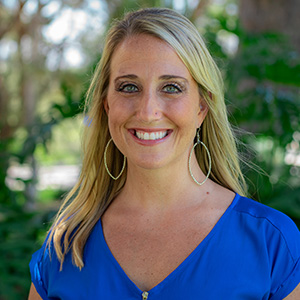Lauren Collins, Ph.D.

Pronouns: She/Her/Hers
Associate Professor
Department of Special Education
SDSU
Primary Email: [email protected]
Phone/Fax
Primary Phone: 619-594-6616
Fax: 619-594-6628
Building/Location
North Education - 72A
Mail Code: 1170
Files
Bio
For advising, request appointment by email at least 24 hours in advance.
Dr. Lauren Collins earned her Ph.D. from Old Dominion University. She began her career as a special education teacher and, prior to joining the faculty at SDSU, she was an assistant professor at the University of Hawaii. She specializes in improving the outcomes of students with and at-risk for emotional and behavioral disorders (EBD) through the translation of research into practice.
She is interested in the identification and dissemination of evidence-based practices for students with EBD and other high-incidence disabilities, specifically in the areas of literacy instruction and behavioral interventions. Given the long-standing gaps between research and practice and the high teacher attrition rates in special education, she is strongly committed to improving teachers’ use of evidence-based practices.
Education
- Ph.D., Special Education; Old Dominion University, 2014
- M.T., Special Education; University of Virginia, 2007
- B.A., Psychology; University of Virginia, 2007
Research
Select Book Chapters
- Collins, L.W., Landrum, T.J., & Sweigart, C.A. (2020). Direct instruction reading for students with emotional and behavioral disorders. In R. Boon, M. Burke, & L. Bowman-Perrot. (Eds). Literacy instruction for students with emotional and behavioral disorders (EBD):Research-based interventions for the classroom. Charlotte: Information Age Publishing, Inc.
- Landrum, T.J., & Collins, L.W. (2018). Sources of evidence-based practices in EBD: Issues and challenges. Advances in learning and behavioral disabilities. In T. J. Landrum, B. G. Cook, M. Tankersley. (Eds.) Advances in learning and behavioral disabilities: effective and ineffective practices in special education (pp. 131-144). London: Emerald Press.
- Collins, L. W., & Cook, L. (2016). Improving classroom behavior through effective praise and reprimands. In B.G. Cook, M. Tankersley, and T. J. Landrum. (Eds.) Advances in learning and behavioral disabilities: effective and ineffective practices in special education (pp. 153-173). London: Emerald Press.
Publications
- Collins, L.W., Landrum, T. J., & Sweigart, C. A. (2020). Extreme school violence and students with emotional and behavioral disorders: (How) do they intersect? Education and Treatment of Children, 43(3), 313-322.
- Cook, B. G., Collins, L. W., Cook, S. C., & Cook, L. (2020). Evidence-based reviews: How evidence-based practices are systematically identified. Learning Disabilities Research & Practice, 35(1), 6-13.
- Collins, L.W., Cook, S.C., Sweigart, C.A., & Evanovich, L.L. (2018). Using performance feedback to increase special education teachers’ use of effective practices. Teaching Exceptional Children.
- Collins, L. W., Sweigart, C. A., Landrum, T. L., & Cook, B. G. (2017). Navigating common challenges and pitfalls in the first years of special education: Solutions for success. Teaching Exceptional Children, 49, 213-222. doi: 10.1177/0040059916685057
- Collins, L. W., & Zirkel., P. A. (2017). Functional behavior assessments and behavior intervention plans: Legal requirements and professional recommendations. Journal of Positive Behavior Interventions, 19, 180-190. doi: 10.1177/1098300716682201
- Cook, B. G., Collins, L. W., Cook, S. E. C., & Cook, L. (2016). A replication by any other name…: A systematic review of replicative intervention studies. Remedial and Special Education, 37, 223-234. doi: 10.1177/ 0741932516637198
- Sweigart, C. A., Collins, L. W., Evanovich, L. L., & Cook, S. C. (2016). An evaluation of the evidence base for performance feedback to improve teacher praise using CEC’s quality indicators. Education and Treatment of Children, 39, 419-444. doi: 10.1177/ 0040059916670629
-
Gable, R. A., & Collins, L. W. (2015). Lessons learned from research and experience about inclusive education of students with behavior problems. Journal of Science of Hanoi National University of Education, 60, 12-15.
